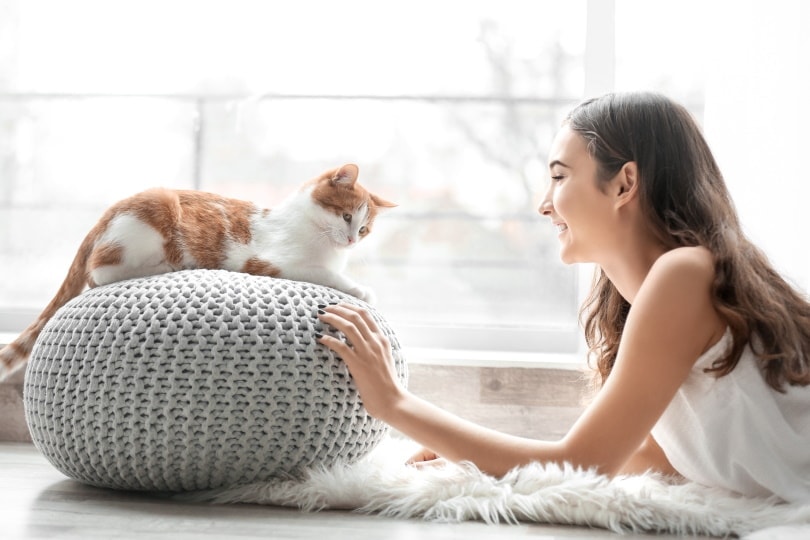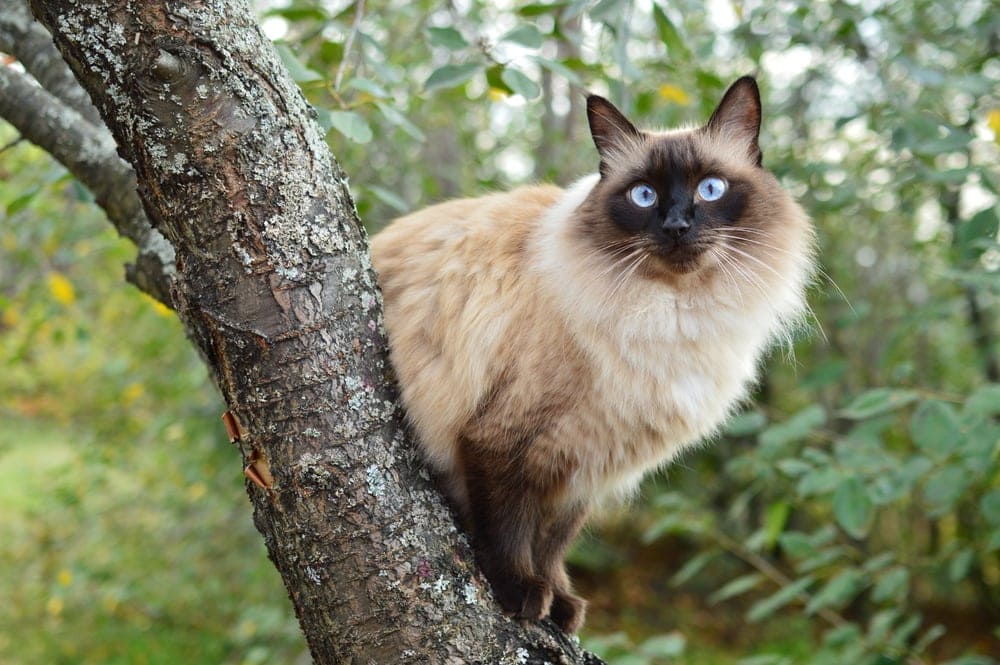Why Does My Cat Eat So Fast? Vet-Reviewed Causes & Prevention

Updated on
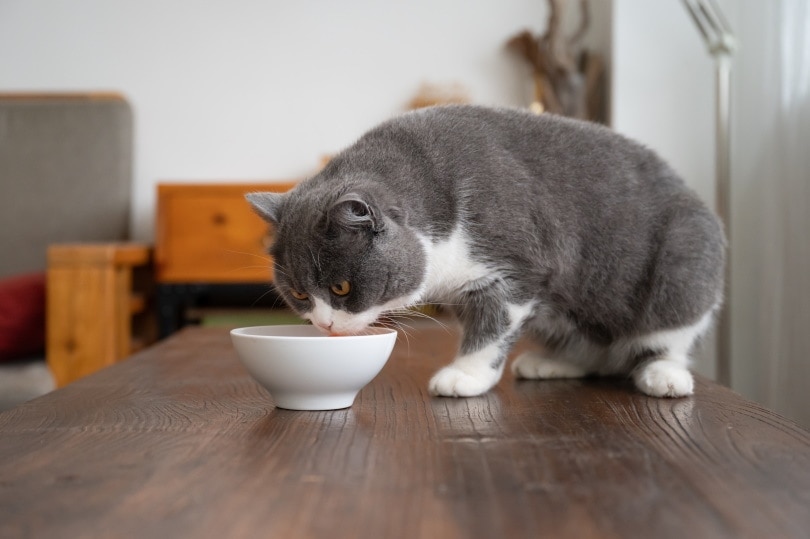
Eating too fast is unfortunately a common issue with cats, but fortunately, there are also many ways to solve it. If your cat’s inhaling its food, it’s important to look for the root cause of the issue to find the most effective way to prevent it.
Let’s take a look at some of the leading causes for cats to eat too fast and different ways to address them.
The 4 Reasons Cats Eat So Fast
Most factors that contribute to fast eating have to do with underlying medical or behavioral issues. One of the first things you’ll want is to work with your veterinarian to rule out any medical causes before investigating behavioral and environmental factors.
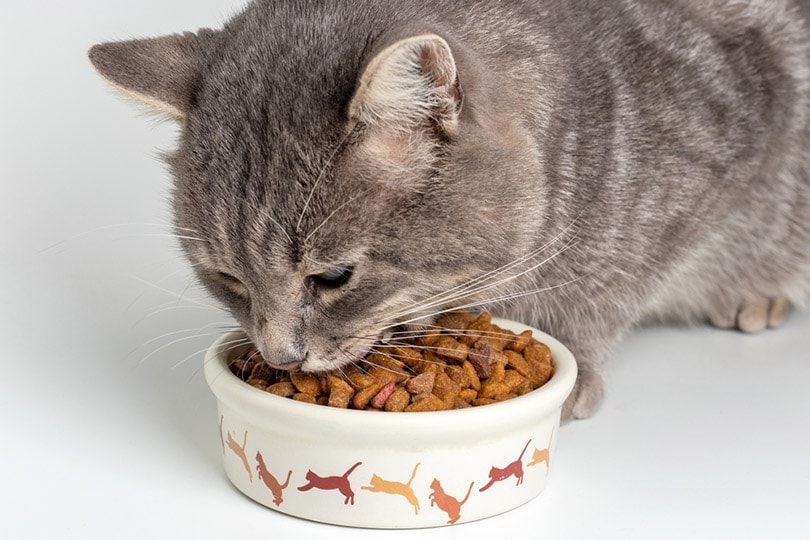
1. Medical Conditions
Some medical conditions can cause cats to eat too quickly. Hyperthyroidism and diabetes mellitus are both common culprits of insatiable appetite. When your cat feels too hungry, the hunger can trigger them to scarf down their food within minutes.
These conditions are often accompanied by increased thirst, so check if your cat is also drinking a lot more water than usual.
Another common medical issue that can trigger fast eating is gastrointestinal parasites. Intestinal parasites can prevent the cat from absorbing nutrients, increasing their appetite and making them eat more ravenously.
2. Food Portions
Sometimes, your cat may simply not eat the correct food portions. As cats mature, their food intake changes, so it’s essential to ensure that they eat the appropriate amount of food with the right kinds of nutrients.
Cats also naturally eat at dawn and dusk. If they only get fed once a day, they can end up scarfing down their food because they’re left feeling extremely hungry throughout the day.
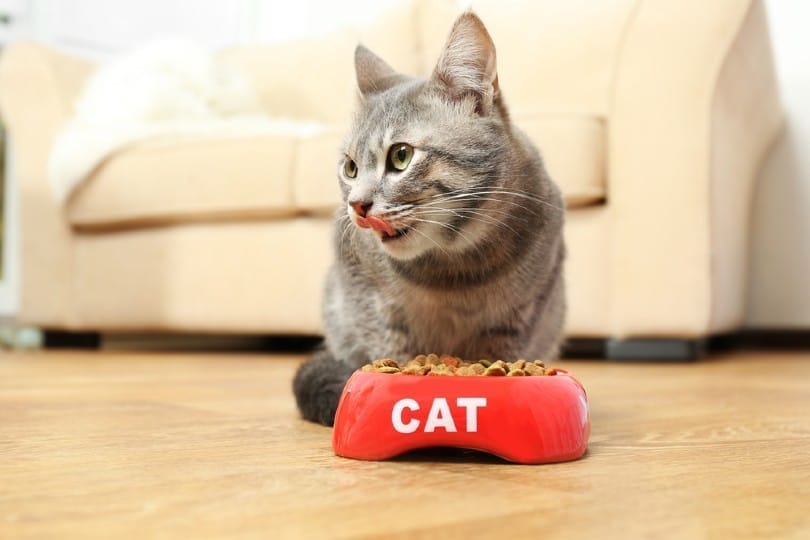
3. Behavioral Issues
Just like how humans can engage in boredom eating, cats can also feel an increased appetite when they don’t have enough stimulation throughout the day. Without any activities to do, cats can end up reverting their energy to eating.
Cats can also experience depression. Although it’s more common for depressed cats to lose their appetites, it’s still possible for them to eat more.
Multi-cat households may also trigger strong territorial behavior from some cats. Food is a highly prized resource for cats. If they feel threatened with their food supply, they may eat more quickly to ensure that they’re getting enough to eat.
4. Past Trauma
If your cat previously lived in a neglectful environment, it could result in eating too fast. Malnourished cats may feel the need to consume any food they see as quickly as possible because they don’t know when their next meal will be.
Stray cats may also exhibit this behavior if they’ve consistently experienced food scarcity.
The 7 Ways to Get a Cat to Stop Eating So Fast
Once you identify the root cause of your cat’s behavior, it’s easier to address it. Here are some things you can do to help your cat eat at a healthier pace.
1. Medication and Supplements
If your cat has a medical condition, make sure to stay on top of any medication that your veterinarian prescribes. Make sure your cat has always a supply of fresh water. If your cat doesn’t normally drink a lot of water, you can try adding cat-safe broth to their meals to help them stay hydrated.
Cats that don’t receive enough nutrients may also overeat, so consult with your veterinarian to see if supplements are necessary for their diet.
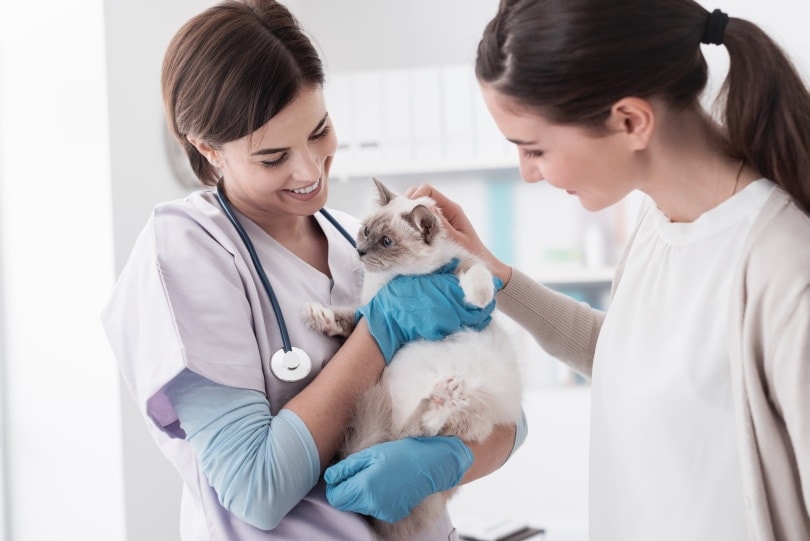
2. Change Feeding Schedule
Instead of feeding your cats once a day, try splitting up their meals so that they eat two or three times a day. It may feel tempting to let them free-feed, but cats can quickly become overweight when owners don’t regulate their food intake. The healthiest way to feed your cats is to put them on a feeding schedule.
If your daily schedule doesn’t allow time for you to feed your cats multiple times a day, consider using an automatic feeder that dispenses food throughout the day. Most automatic feeders are for dry food, but some feeders can also hold wet food.
A consistent feeding schedule will de-stress cats because they can predict and anticipate when they’re able to eat. Predictability and reliability can help them feel like they don’t have to rush to eat.
3. Check Food Portions
Make sure that your cat’s eating enough food. Although overweight pets and obesity are more common for household pets, some cats may be underweight.
A quick way to check if your cat’s at a healthy body weight is to feel for its ribs. You’ll be able to easily feel your cat’s rib cage if you apply gentle pressure. If you have a hard time feeling your cat’s ribs, it’s overweight, and if they’re jutting out or visibly seen, your cat’s underweight.
The best way to determine healthy food portions is to work with your veterinarian. Veterinarians may recommend more nutritious food brands for your cat. They can also help you determine if your cat needs to take extra vitamins and supplements to get all the nutrients it needs.
A cat that receives nutritious meals will feel full faster and for longer, which can help prevent them from inhaling their food at mealtimes.
The exact amount of calories an individual animal needs to maintain a healthy weight is variable and influenced by many factors including genetics, age, breed, and activity level. This tool is meant to be used only as a guideline for healthy individuals and does not substitute veterinary advice
4. Change Eating Location
Make sure that your cats’ eating area is in a quiet place where they feel undisturbed.
Sometimes, the kitchen may feel too busy, especially if you’re preparing your own meal while they’re eating theirs. This arrangement can cause cats to eat more quickly. They may either feel that their food will get taken away or just want to get away from the hustle and bustle and noise.
5. Separate Your Cats
If territory is an issue, try feeding your cats in separate rooms, and make sure that they’re eating in peaceful spots. You can even try feeding them in their own kennels.
Just remember that even cats that get along can still have food competition between them. So, you can help them feel reassured that their food won’t get stolen by assigning them their own eating locations.
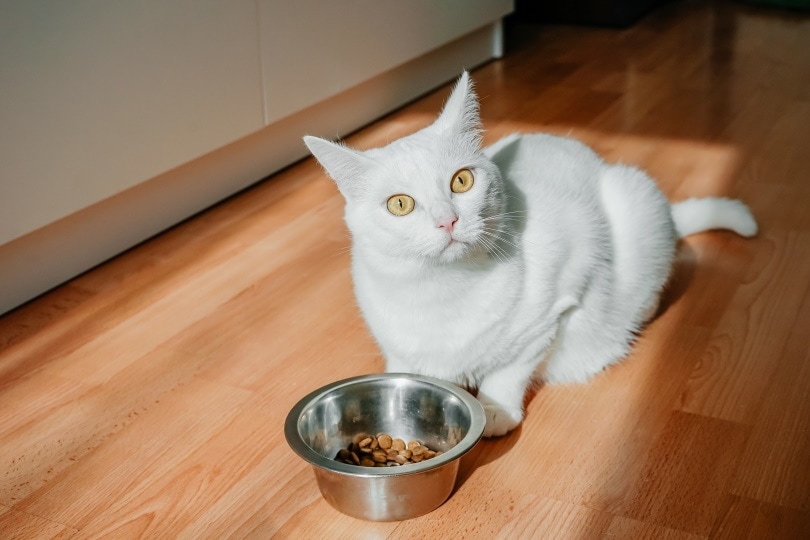
6. Replace Food Bowl
Several food bowls have specific designs to prevent pets from eating too fast. You can also try putting meals on a lick mat. Licking can also help cats de-stress and calm down, so lick mats can also positively affect your cat’s mood and behavior.
7. Use Treat Dispensing Toys
Treat dispensing toys are a great way to slow down your cat’s eating. Since cats have to hunt for food in the wild, treat-dispensing toys help cats engage their instincts.
Playing with these types of toys is an enriching activity. So, not only will it slow down your cat’s eating, but it’ll also be entertaining and mentally engaging. When your cats have plenty of physical and mental exercise, it can help prevent many unwanted behaviors, including boredom eating.
Is It Bad If My Cat Eats Too Fast?
In short, eating too quickly is a negative behavior that can lead to health issues. One of the most common issues you’ll see is cats throwing up their food either immediately or within hours of eating. Frequent vomiting is not normal can lead to other significant health issues, such as malnutrition and imbalances in your cat’s vitals.
If your cat vomits after eating, make sure to remove any access to food for about 12 hours. During this time, provide easy access to water because vomiting can lead to dehydration.
Also, monitor your cat’s behavior for anything else that’s unusual, such as increased lethargy or loose stool. This information will be helpful for veterinarians when they try to diagnose and provide treatment for your cat.
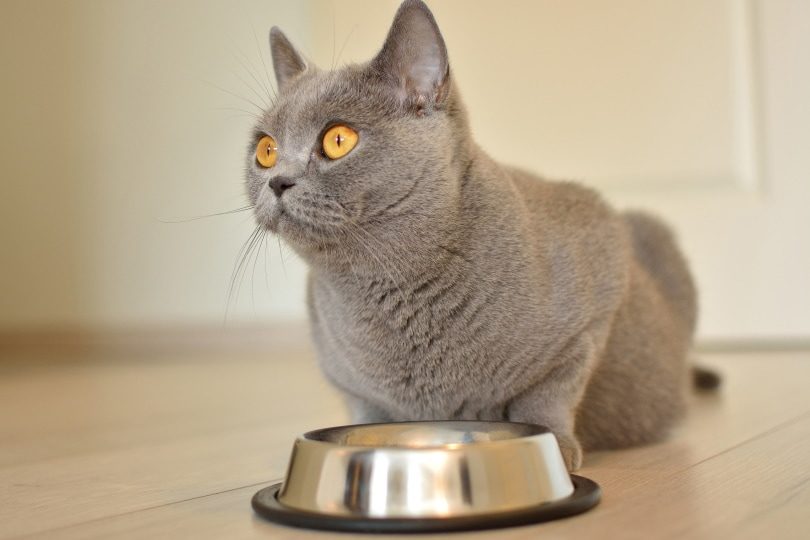
Wrapping Up
No matter how much your cat loves food, it shouldn’t be inhaling meals within a couple of minutes. Eating too quickly can lead to other health concerns, so it’s important to determine what’s causing the behavior to address it effectively.
If you’re ever having trouble figuring out why your cat’s eating so fast, you can always work with a veterinarian or reputable cat behaviorist. Professionals that have a passion for pet wellbeing will be more than willing to help your cat develop healthy eating habits.
Featured Image Credit: Chendongshan, Shutterstock



